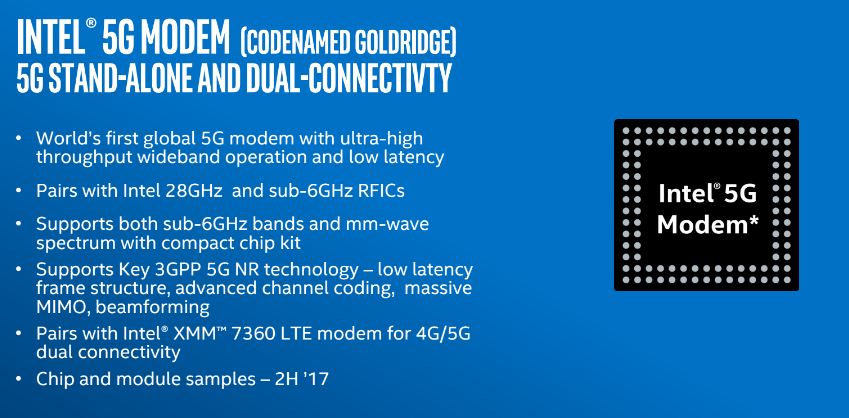Intel announced its 5G modem at the consumer Electronics show (CES) 2017 in Las Vega which they call a “milestone for the industry.”
5G Is Here! Intel Reveals First 5G Modem
Intel has just announced its plan to enter the 5G competition with the Intel 5G modem which is named as Goldridge. Intel announced its 5G modem at the consumer Electronics show (CES) 2017 in Las Vegas which they call a “milestone for the industry.”
The reason why Intel is calling its 5G modem a milestone for the industry is because it will allow companies to develop and launch 5G solutions earlier than previously anticipated.
5G is the successor to today’s 4G, but it will be significantly faster and more versatile. It will combine multiple wireless high-speed and low-bandwidth technologies and enable communications across an array of spectrum bands.
Intel even claimed that their 5G modem chip can provide speeds faster than 5Gbps which is also five times faster than Google Fiber, which offers speed up to 1Gbps while keeping the latency exceptionally low.

The Intel 5G baseband chip pairs with a new 5G transceiver that enables both sub-6Ghz and millimeter-Wave capabilities. It even supports the 28Ghz millimeter-wave band, which should enable deployment trials in U.S, South Korea, and Japan as Intel claimed.
The 28Ghz band will support faster data transfer speed and are expected to be used for 5G networks. New 5G networks are expected to be deployed starting in 2020.
Intel Corporate Vice President Aicha Evans wrote “5G will enable industries to improve our daily lives. With 5G, autonomous vehicles will be able to make decisions in milliseconds to keep drivers and vehicles safe”
“Drones will aid in disaster recovery efforts, providing real-time data for emergency responders. Smart cities will monitor air and water quality through millions of sensors, giving them insights needed to provide a better quality of life”
Intel claimed that they will start testing its new modems in the second half of this year. After the tests are successfully performed, the chip maker will then start producing them.
So, what do you think about this? Share your views in the comment box below.